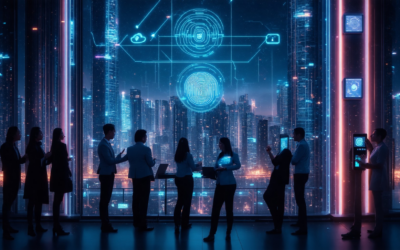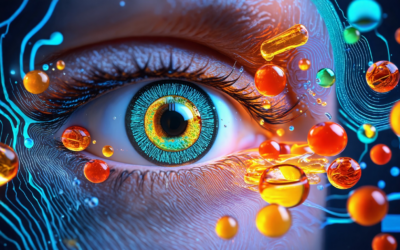Key Takeaways
- Biometics Defined: Biometics focuses on liquid vitamins designed for optimal absorption, enhancing overall wellness.
- Advanced Nutrient Delivery: Utilizing Biocellular Micellization™ technology, biometics ensures faster and more effective nutrient uptake.
- Health Benefits: Biometics vitamins contribute to boosted energy levels, improved mental clarity, and enhanced immune support.
- Biometrics Explained: Biometrics uses unique biological traits for identity verification, increasing security across various sectors.
- Innovative Applications: From smartphone unlocking to airport security, biometrics streamline processes and enhance safety.
- Future Trends: The integration of biometrics with health monitoring technologies promises personalized health insights and improved outcomes.
Welcome to our comprehensive exploration of biometics and biometrics, where we delve into their meanings, benefits, and intriguing connections to vitamins that can enhance your overall wellness. In this article, we will first clarify what biometics entails and how it relates to health, particularly through the lens of biometics vitamins. Next, we will uncover how these biometics liquid vitamins play a pivotal role in nutrition and overall health. Transitioning to biometrics, we will define its significance in today’s world, providing real-world examples and discussing its crucial role in identity verification systems. Furthermore, we will explore the various types of biometrics, including biometrics fingerprint technology, and guide you through the biometrics appointment process, especially for visa applications. Finally, we will highlight the latest advancements in biometrics, showcasing innovations that integrate health and security. Join us as we navigate these fascinating topics, designed to empower you with knowledge and insights for a healthier, more secure future.
What is biometics and how does it relate to wellness?
Biometics is an innovative approach to health and wellness, focusing on the use of advanced liquid vitamins and nutritional supplements designed for optimal absorption and effectiveness. At Shop Biometics, we harness the power of Biocellular Micellization™ technology, which enhances nutrient uptake, ensuring that your body benefits fully from the vitamins you consume. This method allows for a more efficient delivery of essential nutrients, making biometics a game-changer in the wellness industry.
Understanding the Definition of Biometics
The term “biometics” refers to a category of nutritional supplements that prioritize bioavailability, meaning the body can absorb and utilize the nutrients effectively. Unlike traditional vitamins that may require digestion and can lead to nutrient loss, biometics liquid vitamins are formulated to bypass these barriers. This results in faster and more reliable health benefits, such as improved energy levels, enhanced immune function, and better overall wellness. By integrating biometics into your daily routine, you can experience significant health improvements without the hassle of swallowing pills.
The Connection Between Biometics and Vitamins
Biometics is intrinsically linked to vitamins, as these liquid supplements are often rich in essential vitamins and minerals that support various bodily functions. For instance, our biometics liquid vitamins include formulations like Bio Fuel for daily multivitamin support and Bio Immune for antioxidant-driven immune resilience. These products are designed to fill common nutrient gaps, making them ideal for anyone seeking to enhance their health naturally. By choosing biometics, you are opting for a scientifically backed solution that aligns with modern wellness needs.
How do biometics vitamins enhance health?
Biometics vitamins are designed to provide essential nutrients in a highly absorbable liquid form, making them a powerful tool for enhancing overall health. With the innovative micellized technology used in our formulations, these vitamins ensure that your body receives the maximum benefit from each dose. This section explores the role of biometics liquid vitamins in nutrition and their numerous benefits for overall wellness.
The Role of Biometics Liquid Vitamins in Nutrition
Biometics liquid vitamins play a crucial role in nutrition by offering a convenient and effective way to supplement your diet. Unlike traditional pills, which can be difficult to digest, our liquid vitamins are formulated for rapid absorption. This means that your body can utilize the nutrients more efficiently, leading to better health outcomes.
- Enhanced Nutrient Uptake: The micellized technology used in biometics vitamins allows for smaller particle sizes, which enhances nutrient absorption in the digestive system.
- Convenience: Liquid vitamins are easy to take, making them ideal for individuals who struggle with swallowing pills or have digestive issues.
- Comprehensive Formulas: Our range includes targeted blends like Bio Fuel for daily multivitamin support and Bio Immune for immune resilience, ensuring that you can find the right product for your specific health needs.
Benefits of Biometics Vitamins for Overall Wellness
The benefits of biometics vitamins extend beyond basic nutrition. They contribute significantly to overall wellness in various ways:
- Boosted Energy Levels: Formulations like Bio Fuel provide essential vitamins and minerals that can help increase energy and vitality throughout the day.
- Improved Mental Clarity: Products such as Bio Alert are designed to enhance focus and cognitive function, making them perfect for those needing an extra mental boost.
- Support for Immune Health: With antioxidants and immune-boosting ingredients, our Bio Immune formula helps fortify your body’s defenses against illness.
- Stress Relief and Relaxation: Bio Calm is specifically formulated to promote relaxation and reduce stress, contributing to better mental health.
By incorporating biometics vitamins into your daily routine, you can experience a noticeable improvement in your overall health and well-being. To explore our full range of products and discover how they can benefit you, visit Biometics.
Ready to take the next step? Create an account to enjoy up to 20% savings on all Youngevity products and access exclusive bundles and deals. Start your journey towards better health today by visiting our Account Creation & Sign-Up page.
What is the meaning of biometrics in today’s world?
Biometrics has become a crucial aspect of modern technology, impacting various sectors from security to healthcare. At its core, biometrics definition refers to the measurement and statistical analysis of people’s unique physical and behavioral characteristics. This technology is increasingly used for identity verification, ensuring that individuals are accurately recognized based on their biological traits.
Biometrics Definition and Its Importance
The biometrics meaning extends beyond simple identification; it encompasses a wide range of applications that enhance security and streamline processes. For instance, in airports like the biometrics Berlin airport, travelers can experience faster check-ins through facial recognition systems. This not only improves efficiency but also significantly reduces the risk of identity fraud.
Moreover, the importance of biometrics is evident in its application in various sectors, including finance, healthcare, and law enforcement. By utilizing unique identifiers such as biometrics fingerprint and facial recognition, organizations can ensure a higher level of security and accuracy in identity verification. This technology is also pivotal in developing systems that require biometrics identity verification system for secure access to sensitive information.
Examples of Biometrics in Everyday Life
Biometrics is integrated into our daily lives in numerous ways. Common biometrics examples include:
- Smartphone Unlocking: Many smartphones now use fingerprint or facial recognition to unlock devices, providing a seamless user experience.
- Access Control Systems: Offices and secure facilities often employ biometric systems for employee access, ensuring that only authorized personnel can enter.
- Online Banking: Financial institutions are increasingly using biometric authentication methods to enhance security for online transactions.
As we continue to embrace technology, understanding the implications and applications of biometrics will be essential for navigating a world where security and convenience are paramount.
How are biometrics used in identity verification?
Biometrics play a crucial role in modern identity verification systems, providing a reliable and secure method for confirming individual identities. By leveraging unique biological traits, such as fingerprints, facial recognition, and iris scans, biometrics enhance security measures across various sectors, including travel, finance, and personal identification.
Biometrics Identity Verification System Explained
The biometrics identity verification system utilizes advanced technology to analyze and compare biometric data against stored profiles. This process typically involves several steps:
- Data Collection: Biometric data is captured using specialized devices, such as fingerprint scanners or facial recognition cameras.
- Data Processing: The collected data is converted into a digital format and processed to create a unique biometric template.
- Matching: The biometric template is compared to existing records in a database to verify identity.
- Decision Making: If a match is found, access is granted; if not, further verification may be required.
This system is widely used in various applications, including airport security, where biometrics at the Berlin airport streamline passenger processing and enhance safety.
The Role of Biometrics in Security Measures
Biometrics significantly bolster security measures by providing a more accurate and efficient means of identity verification compared to traditional methods, such as passwords or ID cards. Some key benefits include:
- Enhanced Security: Biometrics are difficult to forge, making unauthorized access significantly harder.
- Convenience: Users can authenticate their identity quickly without the need for physical tokens or remembering complex passwords.
- Scalability: Biometrics can be integrated into various systems, from mobile devices to large-scale security infrastructures.
As the demand for secure identity verification continues to grow, the adoption of biometrics is expected to expand, paving the way for innovative applications in both personal and professional contexts. For those interested in exploring the latest in biometric technology, resources like the International Biometrics + Identity Association (IBIA) provide valuable insights into industry trends and advancements.
What are the different types of biometrics?
Biometrics Fingerprint Technology Overview
Biometrics fingerprint technology is one of the most widely recognized forms of biometric identification. This method utilizes unique patterns found in an individual’s fingerprints to verify identity. The process involves capturing a high-resolution image of the fingerprint, which is then converted into a digital template. This template is stored in a database and can be compared against future scans to confirm identity. The accuracy of biometrics fingerprinting is notable, with systems achieving high levels of reliability and speed, making it ideal for various applications, including security systems and access control.
Biometrics Photo Requirements and Guidelines
When it comes to biometrics photo requirements, specific guidelines must be followed to ensure the images meet the necessary standards for identification purposes. A biometrics photo should be recent, clear, and taken against a plain background. The subject’s face must be fully visible, with no shadows or reflections obscuring features. Additionally, the photo should be in color and of high resolution to facilitate accurate recognition. For those preparing for a biometrics appointment, adhering to these guidelines is crucial to avoid delays or rejections in the identity verification process.
How do biometrics appointments work?
Understanding how biometrics appointments function is essential for anyone navigating identity verification processes, especially in contexts such as visa applications or immigration procedures. These appointments are designed to collect biometric data, which can include fingerprints, photographs, and other identifying information. This data is crucial for ensuring security and verifying identities in various systems.
Understanding the Biometrics Appointment Process
The biometrics appointment process typically begins with scheduling an appointment through an official service provider. For example, if you are applying for a visa, you may need to book a biometrics appointment details through a designated platform like VFS Global. During the appointment, applicants will provide their biometric data, which is then securely stored and used for identity verification.
It’s important to prepare for your appointment by ensuring you have the necessary documentation, such as your passport and any confirmation letters. The appointment usually lasts around 30 minutes, during which trained personnel will guide you through the process. This system is designed to be efficient and secure, minimizing the risk of identity fraud.
Biometrics Appointment for Visa Applications
For those applying for visas, the biometrics appointment is a critical step in the application process. The data collected during this appointment helps immigration authorities verify the identity of applicants and assess their eligibility. Understanding the choosing a biometric distributor can also enhance your experience, ensuring you select a reliable provider for your appointment.
In many cases, applicants are required to attend these appointments in person, which adds an extra layer of security to the process. The biometric data collected is not only used for visa applications but can also be integrated into broader biometric identity verification systems, enhancing overall security measures.
What are the latest advancements in biometrics?
In recent years, the field of biometrics has witnessed significant advancements that enhance security and user experience. These innovations are not only transforming identity verification but also integrating health monitoring capabilities, making biometrics more versatile than ever. Here, we explore some of the latest innovations in biometrics screening technologies and the future trends that are shaping its integration with health.
Innovations in Biometrics Screening Technologies
Biometric screening technologies have evolved to include sophisticated methods that improve accuracy and efficiency. Some notable innovations include:
- Facial Recognition: Enhanced algorithms allow for real-time facial recognition, improving accuracy in various lighting conditions and angles. This technology is increasingly used in airports, such as the Berlin airport, to streamline passenger processing.
- Fingerprint Scanning: Advanced fingerprint sensors now utilize ultrasonic technology, providing higher accuracy and the ability to read fingerprints through various surfaces, including glass and plastic.
- Iris Recognition: This method has gained traction due to its high accuracy and non-intrusive nature, making it suitable for secure environments.
- Behavioral Biometrics: By analyzing patterns in user behavior, such as typing speed and mouse movements, this technology adds an additional layer of security, particularly in online transactions.
These innovations not only enhance security measures but also improve user convenience, making biometric systems more appealing to businesses and consumers alike.
Future Trends in Biometrics and Health Integration
The future of biometrics is poised to intersect significantly with health technologies. Key trends include:
- Health Monitoring: Biometrics is increasingly being integrated into health monitoring devices, allowing for real-time tracking of vital signs and health metrics. This integration can lead to personalized health recommendations based on biometric data.
- Wearable Technology: Devices such as smartwatches are incorporating biometric sensors that monitor heart rate, sleep patterns, and physical activity, providing users with comprehensive health insights.
- Telemedicine: As telehealth services expand, biometric verification will play a crucial role in ensuring secure patient identification and data protection during virtual consultations.
- Data Privacy and Security: With the rise of biometric data usage, there will be a stronger emphasis on developing secure systems to protect sensitive health information from breaches.
These trends indicate a promising future where biometrics not only enhances security but also contributes to improved health outcomes. As we continue to innovate, the integration of biometrics into everyday health practices will likely become a standard, paving the way for a healthier society.
For those interested in exploring the benefits of Biometics for health and longevity, our range of essential biometics can help you achieve optimal wellness.






